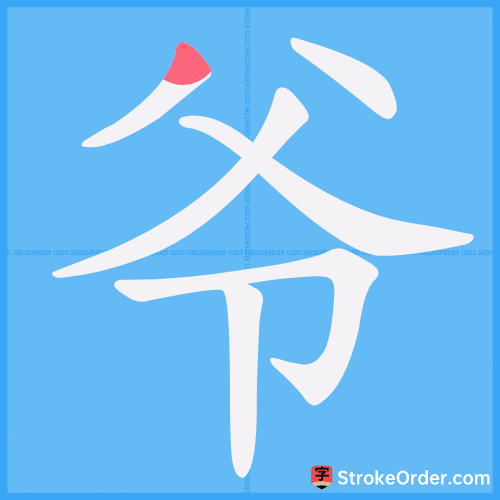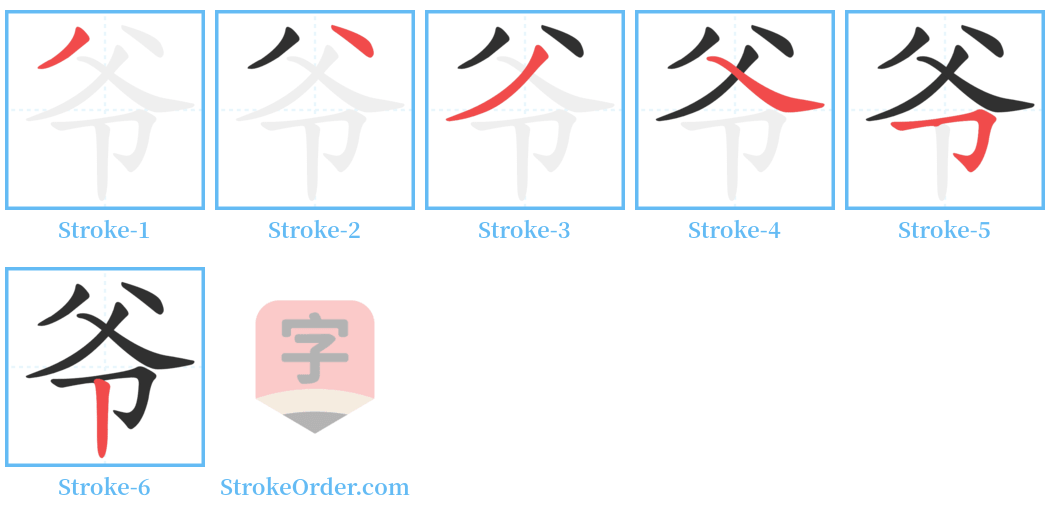爷 Stroke Order
Animated Stroke Order of 爷

Stroke Order Diagrams for 爷

Step-by-Step Handwriting Guide for 爷

Learn to Write Chinese Characters with Video Tutorials
Watch the video of writing the Chinese character "爷", learn the correct stroke order (笔顺) of the character "爷", and master the standard way of writing the character "爷".
Free Printable Handwriting Practice with Stroke Order: 爷
Printable Writing Practice Worksheet of "爷" in Portrait Orientation (Tian Zi Ge)

Printable Writing Practice Worksheet of "爷" in Landscape Orientation (Tian Zi Ge)

Information of 爷
Pinyin
yé
Radical
父
Strokes
6 strokes
Usage
★★★★★
Definition
grandpa / etc. / old gentleman
爷 (yé)
1. Father: "军书十二卷,卷卷有~名" (In every volume of the twelve military books, there is a name of the father.)
2. Grandfather: "~~。姥~。" (Grandfather. Maternal grandfather.)
3. Respectful term for elders or older men: "张大~。" (Respectfully addressing Mr. Zhang.)
4. Old term for bureaucrats, wealthy individuals, etc.: "县太~。" (County magistrate) ; "少(shào )~。" (Young master.)
5. Term for Buddha or deities: "佛~。" (Buddha) ; "财神~。" (God of wealth.)
6. Same meaning as the original meaning. Can also be written as "耶" (father).
7. Grandfather—often used in repetition.
8. Respectful term for men of the same generation as one's grandfather or of similar age.
9. Respectful title for older or senior men (uncle).
10. Old term for masters, officials, or nobles (master): e.g., "王爷" (Prince); "相爷" (Prime Minister); "老爷" (Master); "少爷" (Young master).
11. Superstitious people’s term for gods or deities (god).
12. Self-claimed term (I).
Examples:
- "《木兰诗》:愿为市鞍马,从此替爷征。" (In Mulan's poem: I wish to buy saddles and horses to serve my father.)
- "爷爷会织布、会种田、还会养牛。" (Grandpa can weave, farm, and even raise cattle.)
Buddha (term of respect for Sakyamuni 釋迦牟尼|释迦牟尼[Shi4 jia1 mou2 ni2]) / His Holiness (refers to a Buddhist grandee) / Buddha / God / emperor / in late Qing court, refers exclusively to Empress Dowager Cixi 慈禧太后[Ci2 xi3 tai4 hou4]
(respectful for) one's grandfather / sb's father / older people / the head of the house (used by servants) / a district magistrate
Input Method for 爷
Pinyin
ye2
Wubi
wqbj|wrbj
Cangjie
cksl
Zhengma
ooy
Four Corner
80227
Unicode
U+7237
Same Pronunciation Characters